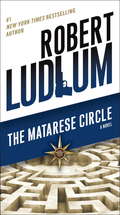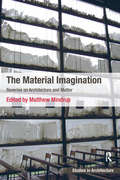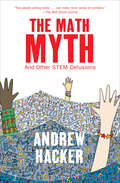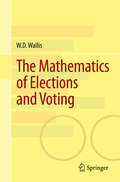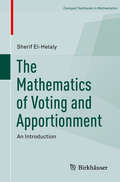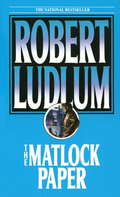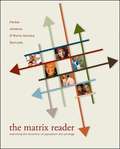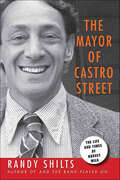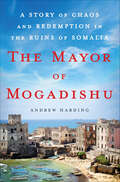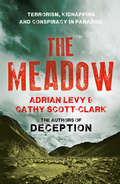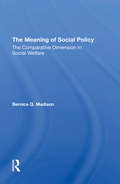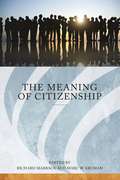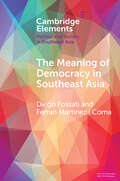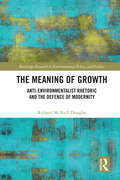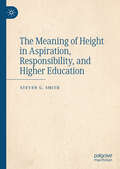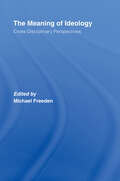- Table View
- List View
The Matarese Circle: A Novel (Matarese #1)
by Robert LudlumAn international circle of killers, the Matarese will undoubtedly take over the world within just two years. Only two rival spies have the power to stop them: Scofield, CIA, and Talaniekov, KGB. They share a genius for espionage and a life of explosive terror and violence. But though these sworn enemies once vowed to terminate each other, they must now become allies. Because only they possess the brutal skills and ice-cold nerves vital to their mission: destroy the Matarese. Praise for Robert Ludlum and The Matarese Circle "A blockbuster . . . Ludlum's best."--The Wall Street Journal "A spellbinder."--The Dallas Morning News "Ludlum stuffs more surprises into his novels than any other six-pack of thriller writers combined."--The New York Times "Don't ever begin a Ludlum novel if you have to go to work the next day."--Chicago Sun-Times BONUS: This edition includes an excerpt from Robert Ludlum's The Bourne Identity.
The Match of the Century: England, Hungary, and the Game that Changed Football Forever
by Matt CloughOn 25 November 1953, the footballing landscape was altered forever. In a mist-shrouded Wembley Stadium, the beautiful game’s historic dominant force, England, met the most exciting team of the 1950s, Hungary. What followed sent shockwaves through the very foundations that the sport was built upon.After years of crumbling decline, the British Empire seemed to be enjoying a resurgence with the coronation of the popular young Elizabeth II. As such, England played with the crushing weight of expectation upon their shoulders, defending their proud, unbeaten home record and protecting the reputation of the nation. Hungary, meanwhile, took on football’s most venerated team in the knowledge that they had the opportunity to make history by emerging victorious – anything less would not be tolerated.The newspapers called it the Match of the Century before it had even begun. By the time it was over, writers, players and fans were wondering if such a lofty billing had in fact undersold the contest. Now, over sixty years later, the match is imbued with meaning and symbolism far beyond the football pitch. This is the story of a match that would change the course of football history forever.
The Material Imagination: Reveries on Architecture and Matter (Ashgate Studies In Architecture Ser.)
by Matthew MindrupIn recent years architectural discourse has witnessed a renewed interest in materiality under the guise of such familiar tropes as 'material honesty,' 'form finding,' or 'digital materiality.' Motivated in part by the development of new materials and an increasing integration of designers in fabricating architecture, a proliferation of recent publications from both practice and academia explore the pragmatics of materiality and its role as a protagonist of architectural form. Yet, as the ethos of material pragmatism gains more popularity, theorizations about the poetic imagination of architecture continue to recede. Compared to an emphasis on the design of visual form in architectural practice, the material imagination is employed when the architect 'thinks matter, dreams in it, lives in it, or, in other words, materializes the imaginary.' As an alternative to a formal approach in architectural design, this book challenges readers to rethink the reverie of materials in architecture through an examination of historical precedent, architectural practice, literary sources, philosophical analyses and everyday experience. Focusing on matter as the premise of an architect’s imagination, each chapter identifies and graphically illustrates how material imagination defines the conceptual premises for making architecture.
The Math Myth: And Other STEM Delusions
by Andrew HackerA New York Times–bestselling author looks at mathematics education in America—when it&’s worthwhile, and when it&’s not. Why do we inflict a full menu of mathematics—algebra, geometry, trigonometry, even calculus—on all young Americans, regardless of their interests or aptitudes? While Andrew Hacker has been a professor of mathematics himself, and extols the glories of the subject, he also questions some widely held assumptions in this thought-provoking and practical-minded book. Does advanced math really broaden our minds? Is mastery of azimuths and asymptotes needed for success in most jobs? Should the entire Common Core syllabus be required of every student? Hacker worries that our nation&’s current frenzied emphasis on STEM is diverting attention from other pursuits and even subverting the spirit of the country. Here, he shows how mandating math for everyone prevents other talents from being developed and acts as an irrational barrier to graduation and careers. He proposes alternatives, including teaching facility with figures, quantitative reasoning, and understanding statistics. Expanding upon the author&’s viral New York Times op-ed, The Math Myth is sure to spark a heated and needed national conversation—not just about mathematics but about the kind of people and society we want to be. &“Hacker&’s accessible arguments offer plenty to think about and should serve as a clarion call to students, parents, and educators who decry the one-size-fits-all approach to schooling.&” —Publishers Weekly, starred review
The Mathematics Teacher in the Digital Era
by Nathalie Sinclair Alison Clark-Wilson Ornella RobuttiThis volume addresses the key issue of the initial education and lifelong professional learning of teachers of mathematics to enable them to realize the affordances of educational technology for mathematics. With invited contributions from leading scholars in the field, this volume contains a blend of research articles and descriptive texts. In the opening chapter John Mason invites the reader to engage in a number of mathematics tasks that highlight important features of technology-mediated mathematical activity. This is followed by three main sections: An overview of current practices in teachers' use of digital technologies in the classroom and explorations of the possibilities for developing more effective practices drawing on a range of research perspectives (including grounded theory, enactivism and Valsiner's zone theory). A set of chapters that share many common constructs (such as instrumental orchestration, instrumental distance and double instrumental genesis) and research settings that have emerged from the French research community, but have also been taken up by other colleagues. Meta-level considerations of research in the domain by contrasting different approaches and proposing connecting or uniting elements
The Mathematics of Elections and Voting
by W. D. WallisThis title takes an in-depth look at the mathematics in the context of voting and electoral systems, with focus on simple ballots, complex elections, fairness, approval voting, ties, fair and unfair voting, and manipulation techniques. The exposition opens with a sketch of the mathematics behind the various methods used in conducting elections. The reader is lead to a comprehensive picture of the theoretical background of mathematics and elections through an analysis of Condorcet's Principle and Arrow's Theorem of conditions in electoral fairness. Further detailed discussion of various related topics include: methods of manipulating the outcome of an election, amendments, and voting on small committees. In recent years, electoral theory has been introduced into lower-level mathematics courses, as a way to illustrate the role of mathematics in our everyday life. Few books have studied voting and elections from a more formal mathematical viewpoint. This text will be useful to those who teach lower level courses or special topics courses and aims to inspire students to understand the more advanced mathematics of the topic. The exercises in this text are ideal for upper undergraduate and early graduate students, as well as those with a keen interest in the mathematics behind voting and elections.
The Mathematics of Voting and Apportionment: An Introduction (Compact Textbooks in Mathematics)
by Sherif El-HelalyThis textbook contains a rigorous exposition of the mathematical foundations of two of the most important topics in politics and economics: voting and apportionment, at the level of upper undergraduate and beginning graduate students. It stands out among comparable books by providing, in one volume, an extensive and mathematically rigorous treatment of these two topics.The text’s three chapters cover social choice, yes-no voting, and apportionment, respectively, and can be covered in any order, allowing teachers ample flexibility. Each chapter begins with an elementary introduction and several examples to motivate the concepts and to gradually lead to more advanced material. Landmark theorems are presented with detailed and streamlined proofs; those requiring more complex proofs, such as Arrow’s theorems on dictatorship, Gibbard’s theorem on oligarchy, and Gärdenfors’ theorem on manipulation, are broken down into propositions and lemmas in order to make them easier to grasp. Simple and intuitive notations are emphasized over non-standard, overly complicated symbols. Additionally, each chapter ends with exercises that vary from computational to “prove or disprove” types.The Mathematics of Voting and Apportionment will be particularly well-suited for a course in the mathematics of voting and apportionment for upper-level undergraduate and beginning graduate students in economics, political science, or philosophy, or for an elective course for math majors. In addition, this book will be a suitable read for to any curious mathematician looking for an exposition to these unpublicized mathematical applications.No political science prerequisites are needed. Mathematical prerequisites (included in the book) are minimal: elementary concepts in combinatorics, graph theory, order relations, and the harmonic and geometric means. What is needed most is the level of maturity that enables the student to think logically, derive results from axioms and hypotheses, and intuitively grasp logical notions such as “contrapositive” and “counterexample.”
The Matlock Paper: A Novel (Los Jet De Plaza Y J Ser.)
by Robert LudlumThe name on the computer screen is James Barbous Matlock. Vietnam veteran. College professor. He's Washington's choice to stop a far-reaching conspiracy, an undercover assignment destined to put Matlock's neck against the razor's edge of danger. And the faceless men in Washington don't care if it means savaging the women Matlock loves, or trapping Matlock in a maze of unrelenting terror. They care about just one thing: that Matlock is the perfect man for the job...for a reason that is disturbing, violent, and extremely deadly. BONUS: This edition includes an excerpt from Robert Ludlum's The Bourne Identity.
The Matriarch: Barbara Bush and the Making of an American Dynasty
by Susan PageA vivid biography of former First Lady Barbara Bush, one of the most influential and under-appreciated women in American political history. <P><P>Barbara Pierce Bush was one of the country's most popular and powerful figures, yet her full story has never been told. <P><P>THE MATRIARCH tells the riveting tale of a woman who helped define two American presidencies and an entire political era. Written by USA TODAY's Washington Bureau chief Susan Page, this biography is informed by more than one hundred interviews with Bush friends and family members, hours of conversation with Mrs. Bush herself in the final six months of her life, and access to her diaries that spanned decades. <P><P>THE MATRIARCH examines not only her public persona but also less well-known aspects of her remarkable life. As a girl in Rye, New York, Barbara Bush weathered criticism of her weight from her mother, barbs that left lifelong scars. As a young wife, she coped with the death of her three-year-old daughter from leukemia, a loss that changed her forever. <P><P>In middle age, she grappled with depression so serious that she contemplated suicide. And as first the wife and then the mother of American presidents, she made history as the only woman to see -- and advise -- both her husband and son in the Oval Office. As with many women of her era, Barbara Bush was routinely underestimated, her contributions often neither recognized nor acknowledged. But she became an astute and trusted political campaign strategist and a beloved First Lady. <P><P>She invested herself deeply in expanding literacy programs in America, played a critical role in the end of the Cold War, and led the way in demonstrating love and compassion to those with HIV/AIDS. <P><P>With her cooperation, this book offers Barbara Bush's last words for history -- on the evolution of her party, on the role of women, on Donald Trump, and on her family's legacy.Barbara Bush's accomplishments, struggles, and contributions are many. <P><P>Now, Susan Page explores them all in THE MATRIARCH, a groundbreaking book certain to cement Barbara Bush as one of the most unique and influential women in American history. <P><b>A New York Times Bestseller</b>
The Matrix Reader: Examining the Dynamics of Oppression and Privilege
by Abby L. Ferber Christina M. Jimenez Andrea O'Reilly Herrera Dena R. SamuelsWritten by four authors from different disciplinary backgrounds, this reader promotes a commitment to an intersectional approach to teaching race, class, gender and sexuality. Unlike most books of its kind, it highlights the duality of privilege and oppression and the effects that race, gender, and sexuality have on our lives. This reader includes poems, reflective literary prose, historical events and documents, images drawn from the media, contemporary statistics of inequalities, visual images, and tools that empower students to become agents for social change.
The Maverick: George Weidenfeld and the Golden Age of Publishing
by Thomas HardingThe captivating story of the famed publisher George Weidenfeld, from his struggles as an Austrian-Jewish refugee in London to his rise as a world-renowned literary figure. After arriving in London just before World War Two as a penniless Austrian-Jewish refugee, George Weidenfeld went on to transform not only the world of publishing but the culture of ideas. The books that he published include momentous titles such as Lolita, Double Helix, The Group, and The Hedgehog and the Fox, with authors he championed ranging from Joan Didion, Mary McCarthy, JD Salinger, and Edna O&’Brien to Henry Miller, Harold Wilson, Saul Bellow, and Henry Kissinger. His role as publisher brought him into the orbit of influential figures such as George Bush, Ann Getty, Donald Trump, and LBJ. In this first biography, Thomas Harding provides a full, unvarnished, and at times difficult history of this complex and fascinating character. Throughout his long career, he was written about in the New York Times, the Washington Post, Time Magazine, Vanity Fair, and other publications. Was he, as described by some, the &“greatest salesperson,&” &“the world&’s best networker,&” &“the publisher&’s publisher,&” and &“a great intellectual&”? Was his lifelong effort to be the world&’s most famous host a cover for his desperate loneliness? Who, in fact, was the real George Weidenfeld and how did he rise so successfully within the ranks of New York and London society? Drawing on author correspondence, internal memos, and other documents buried deep in the secret publishing files of Weidenfeld & Nicolson, Harding crafts a portrait of the publisher's life that is inextricable from the efforts and intricacies of putting a book into the world. Structured around twenty books associated with George Weidenfeld, and intercut with explorations of contemporary concerns such as cancel culture, the right to publish, freedom of speech, and separating the art from the artist, The Maverick tells the captivating story behind the life of this iconic publisher.
The Mayor of Castro Street: The Life and Times of Harvey Milk
by Randy ShiltsBiography of the gay San Francisco supervisor.
The Mayor of Castro Street: The Life and Times of Harvey Milk
by Randy ShiltsThe Mayor of Castro Street is Shilts's acclaimed story of Harvey Milk, the man whose personal life, public career, and tragic assassination mirrored the dramatic and unprecedented emergence of the gay community in America during the 1970s.Known as "The Mayor of Castro Street" even before he was elected to the San Francisco Board of Supervisors, Harvey Milk's personal and political life is a story full of personal tragedies and political intrigues, assassinations at City Hall, massive riots in the streets, the miscarriage of justice, and the consolidation of gay power and gay hope.The Mayor of Castro Street is a story of personal tragedies and political intrigues, assassination in City Hall and massive riots in the streets, the miscarriage of justice and the consolidation of gay power and gay hope.Harvey Milk has been the subject of numerous books and movies, including the Academy Award–winning 1984 documentary, The Times of Harvey Milk. His life is also the basis of a 2008 major motion picture, Milk, starring Sean Penn.
The Mayor of Mogadishu: A Story of Chaos and Redemption in the Ruins of Somalia
by Andrew Harding"This is a triumph of a book: surprising, informative, and humane." —Alexander McCall Smith"Stunning." —Foreign Affairs"Pieces together Nur's astonishing biography and follows him when he became mayor in 2010 and tried to restore confidence and bring back investment to the battered Somali capital." —NPR“Part on-the-ground war reporting, part investigative biography, Harding’s book captures both the fragile hopes and the appalling violence of Somalia . . . .” —The New York Times**A Foreign Affairs Best Book of 2017****One of Book Concierge's Best Books of 2016**In The Mayor of Mogadishu, one of the BBC’s most experienced foreign correspondents, Andrew Harding, reveals the tumultuous life of Mohamoud “Tarzan” Nur - an impoverished nomad who was abandoned in a state orphanage in newly independent Somalia, and became a street brawler and activist. When the country collapsed into civil war and anarchy, Tarzan and his young family became part of an exodus, eventually spending twenty years in north London.But in 2010 Tarzan returned, as Mayor, to the unrecognizable ruins of a city now almost entirely controlled by the Islamist militants of Al Shabab. For many in Mogadishu, and in the diaspora, Tarzan became a galvanizing symbol of courage and hope for Somalia. But for others, he was a divisive thug, who sank beneath the corruption and clan rivalries that continue, today, to threaten the country’s revival.The Mayor of Mogadishu is a rare an insider’s account of Somalia’s unraveling, and an intimate portrayal of one family’s extraordinary journey.
The Mayor's Coffee - How to administrate the city like a barista
by Sal Da Costa M. RescignoIn the hot South of Italy, the owner of a bar explains to the young new mayor how to prepare the best coffee in the world and how to run the city.
The McSweeney's Book of Politics and Musicals
by McSweeney'sEver since John Hancock broke into song after signing the Declaration of Independence, American politics and musicals have been inextricably linked. From Alexander Hamilton's jazz hands, to Chester A. Arthur's oboe operas, to Newt Gingrich's off-Broadway sexscapade, You, Me, and My Moon Colony Mistress Makes Three, government and musical theater have joined forces to document our nation's long history of freedom, partisanship, and dancers on roller skates pretending to be choo choo trains. To celebrate this grand union of entrenched bureaucracy and song, the patriots at McSweeney's Internet Tendency ("The Iowa Caucus of humor websites") offer this riotous collection (peacefully assembled!) of monologues, charts, scripts, lists, diatribes, AND musicals written by the noted fake-musical lyricist, Ben Greenman. On the agenda are . . . Fragments from PALIN! THE MUSICAL Barack Obama's Undersold 2012 Campaign Slogans Atlas Shrugged Updated for the Financial Crisis Your Attempts to Legislate Hunting Man for Sport Reek of Class Warfare A 1980s Teen Sex Comedy Becomes Politically Uncomfortable Donald Rumsfeld Memoir Chapter Title Or German Heavy Metal Song? Noises Political Pundits Would Make If They Were Wild Animals and Not Political Pundits Ron Paul Gives a Guided Tour of His Navajo Art Collection Classic Nursery Rhymes, Updated and Revamped for the Recession, As Told to Me By My Father And much more!
The Meadow: Kashmir 1995 - Where The Terror Began
by Cathy Scott-Clark Adrian LevyThe shocking true story of a brutal kidnapping high in the mountains of Kashmir that marked the beginning of modern terrorism. In July 1995, ten backpackers journeyed into the foothills of the Himalayas, trekking to an idyllic campsite known as the Meadow. But their search for tranquillity was savagely interrupted when they were taken hostage by Islamic extremists. Using diaries, letters, classified police reports and interviews with the jihadis themselves, The Meadow traces the escalating tension between kidnappers, victims and police, while examining the high-level conspiracies surrounding the abduction. It tells of the single escape attempt and how – with a brutal beheading – the hostage takers took an irreversible step into the abyss. The shocking true story of the crisis that foreshadowed a new epoch of global terrorism, this is the book that forced Intelligence and government authorities to uncover what really happened in the Meadow.
The Meaning Of Hitler
by Ewald Osers Sebastian HaffnerThis is a remarkable historical and psychological examination of the enigma of Adolf Hitler who he was, how he wielded power, and why he was destined to fail. Beginning with Hitler's early life, Sebastian Haffner probes the historical, political, and emotional forces that molded his character. In examining the inhumanity of a man for whom politics became a substitute for life, he discusses Hitler's bizarre relationships with women, his arrested psychological development, his ideological misconceptions, his growing obsession with racial extermination, and the murderous rages of his distorted mind. Finally, Haffner confronts the most disturbing question of all: Could another Hitler rise to power in modern Germany?
The Meaning Of Social Policy: The Comparative Dimension In Social Welfare
by Bernice Q. MadisonThe purpose of this book is to survey the literature on social welfare policies and planning of different nations in order to explain some of the major problems that are encountered in comparative research and to highlight what has been learned so far.
The Meaning of Citizenship (Series in Citizenship Studies)
by Richard Marback Marc W. KrumanThe essays in this volume are drawn from the tenth anniversary conference of the Center for the Study of Citizenship at Wayne State University, whose theme, "The Meaning of Citizenship," provided an opportunity to reflect on a decade of study in the field. In an academic area where definitions are dynamic and multidisciplinary, editors Richard Marback and Marc W. Kruman have assembled fifteen contributors to show some of the rich nuances of membership in a political community. The Meaning of Citizenship addresses four dimensions of citizenship: the differentiation of citizenship in theory and practice, the proper horizon of citizenship, the character of civic bonds, and the resolution of conflicting civic and personal obligations. Contributors answer these questions from varying disciplinary perspectives, including ethnography, history, and literary analysis. Essays also consider the relevance of these questions in a number of specific regions, from Africa to the Caribbean, Middle East, Europe, and the United States. By identifying the meaning of citizenship in terms of geographic specificity and historical trajectory, the essays in this volume argue as a whole for a cross-disciplinary approach to the issues of inclusion and exclusion that are generated through any assertion of what citizenship means. The four primary concerns taken up by the contributors to this volume are as timely as they are timeless. Scholars of history, political science, sociology, and citizenship studies will appreciate this conversation about the full meaning of citizenship.
The Meaning of Democracy in Southeast Asia: Liberalism, Egalitarianism and Participation (Elements in Politics and Society in Southeast Asia)
by Diego Fossati Ferran Martinez i ComaThis Element contributes to existing research with an analysis of public understandings of democracy based on original surveys fielded in Indonesia, Malaysia, the Philippines, Singapore and Thailand. It conceptualises democracy as consisting of liberal, egalitarian and participatory ideals, and investigates the structure of public understandings of democracy in the five countries. It then proceeds to identify important relationships between conceptions of democracy and other attitudes, such as satisfaction with democracy, support for democracy, trust in institutions, policy preferences and political behaviour. The findings suggest that a comprehensive analysis of understandings of democracy is essential to understand political attitudes and behaviours.
The Meaning of Freedom
by Angela Y. Davis Robin D.G. Kelley"Davis' arguments for justice are formidable. . . . The power of her historical insights and the sweetness of her dream cannot be denied."-The New York TimesWhat is the meaning of freedom? Angela Y. Davis' life and work have been dedicated to examining this fundamental question and to ending all forms of oppression that deny people their political, cultural, and sexual freedom. In this collection of twelve searing, previously unpublished speeches, Davis confronts the interconnected issues of power, race, gender, class, incarceration, conservatism, and the ongoing need for social change in the United States. With her characteristic brilliance, historical insight, and penetrating analysis, Davis addresses examples of institutional injustice and explores the radical notion of freedom as a collective striving for real democracy-not a thing granted by the state, law, proclamation, or policy, but a participatory social process, rooted in difficult dialogues, that demands new ways of thinking and being. "It is not too much," writes Robin D.G. Kelly in the introduction, "to call her one of the world's leading philosophers of freedom." The Meaning of Freedom articulates a bold vision of the society we need to build and the path to get there. This is her only book of speeches and her first full-length book since Are Prisons Obsolete? (2003).Angela Y. Davis is professor emerita at the University of California and author of eight books. She is a much sought after public speaker and an internationally known advocate for social justice.Robin D.G. Kelley is the author of many books and a professor at the University of Southern California.
The Meaning of Growth: Anti-Environmentalist Rhetoric and the Defence of Modernity (Routledge Research in Environmental Policy and Politics)
by Richard McNeill DouglasSince the Limits to Growth report was published in 1972 it has been widely known that a commitment to endless growth was putting us on course for environmental disaster—so why have we failed to take decisive political action in the half-century since then? In The Meaning of Growth, Richard McNeill Douglas uses interpretive social science to uncover the cultural roots of political resistance to environmental science and policy.Through a close reading of anti-environmentalist rhetoric the book identifies its idolisation of growth as a defence of a modern (Western-European) world-view, focusing on values of freedom, power, and immortality. The significance of these findings is drawn out by applying the ‘secularisation thesis’, a theoretical account of the development of a modern understanding of reality from a theological world-view to which it is ostensibly opposed. This framework is used to offer a deep interpretation of what is at stake in environmental debate: that to accept there are limits to growth means abandoning crucial elements of a faith in a theodicy of progress that makes life meaningful in a secular age. Douglas concludes by suggesting that the precondition for political action on the environment is a change of philosophical perspective that provides for a sense of meaning in a world of limits.This book should be of interest to academics in the fields of environmental sociology and communications studies, as well as activists interested in understanding the motivations of anti-environmentalist campaigners and how to counter their influence.
The Meaning of Height in Aspiration, Responsibility, and Higher Education
by Steven G. SmithThe Meaning of Height takes seriously the traditional figure of “higher life” for intrinsically preferable manners of living. Reworking the Platonic model of ascent to the ideal and descent to responsible engagement with the world, The Meaning of Height lays out concrete possible itineraries of reaching (upward to new acquisitions of personal capacity) and righting (downward from prompts for good order), showing connections between individual and social fulfillment. By focusing on our diversely demanding encounters with the interesting, the important, and the transcendent, the book strikes a counterpoint to the commonly homogenized conception of personal “happiness.” It also counters illiberal views of higher education with a Humboldtian vitality argument for a meaningfully “high” higher education geared to full development of human faculties, a level of education to which the disciplines of philosophy and religious studies make essential contributions. The book concludes by considering the essential role of this sort of higher education in democratic societies.
The Meaning of Ideology: Cross-Disciplinary Perspectives
by Michael FreedenThis is the first collection to bring together leading scholars from diverse disciplines to offer a variety of perspectives on ideology and its analysis, emphasizing the input of different intellectual and scholarly traditions to the meaning of ideology. The articles explore commonalities in the use and understanding of ideology as well as delineating constructive differences in its interpretation, while illuminating the changes that the concept of ideology, as well as the practices it signifies, has undergone in recent years. Contributions are included from the fields of political theory, history, literature, political science, cultural studies, post-Marxism, discourse analysis, language studies, law, and sociology.The Meaning of Ideology advances our understanding of the intricacy and relevance of ideology, and offers the latest theories and insights that currently inform scholarship on the subject. Ideology emerges through the pages of this collection more strongly than ever as a major tool of understanding political language and as a durable and normal phenomenon that is inherent in the many ways we conceive the world around us.This book was previously published as a special issue of The Journal of Political Ideologies and will be of interest to students of political ideologies and political and social theory.
